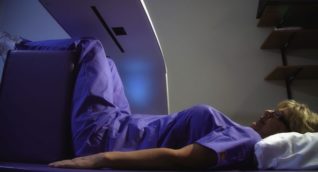Getting a bone densitometry exam can give you the information you need to keep your bones healthy, especially as you age. To prevent fractures, it is important to be diagnosed early. There are a number of lifestyle and dietary changes you can make to increase your bone density and medication is sometimes recommended. It is important for both men and women to be aware of their bone density, especially after age 65 for women and 70 for men, or even earlier if you have risk factors. If you have a family history of osteoporosis, you may want to get a bone densitometry exam as early as 50.
Bone densitometry (also called dual-energy x-ray absorptiometry, DEXA or DXA) is a special X-ray exam used to measure bone mineral content and density. Higher bone mineral content and density means bones are stronger and less likely to break. DXA produces images of bones, usually in the lower spine or hips to determine bone density. This exam is typically used to diagnose osteoporosis (“thinning of the bones”) or osteopenia (reduced bone mass of less severity than osteoporosis) or to assess your risk for an osteoporotic fracture. Bone densitometry is simple, fast, and painless.
When you get your results, you may want to talk them over with your doctor. For information about your results, see Understanding Your Bone Densitometry Results.
If you are at risk of developing osteoporosis – or if you have already been diagnosed with osteoporosis – your doctor may order a bone densitometry scan. Osteoporosis can lead to an increased risk of bone fractures, especially of the hip. Also, people with osteoporosis may be susceptible to compression fractures of the spine.
Risk factors for osteoporosis include:
- Being female and post-menopausal
- Aging: being a male age 70 or older or a female age 65 or older
- Having a history of bone fracture occurring with only slight trauma
- Being white or Asian
- Having a family history of osteoporosis
- Having a tall or thin body frame
- Having an overactive thyroid, parathyroid, or adrenal gland
- Having low calcium levels due to low dietary intake, eating disorders, or GI surgery
- Taking medications that weaken bone (steroids, anti-seizure drugs, and some cancer treatments)
- Diseases such as celiac disease, inflammatory bowel disease, rheumatoid arthritis, multiple myeloma, some cancers, and problems with the liver or kidney.
- Lack of exercise, excess alcohol consumption, and smoking
If you have any of these risk factors, your doctor may recommend a bone density scan. The results help determine the severity of any disease and the progress of treatment.
Benefits
- Bone densitometry is a fast, painless, and noninvasive way to diagnose osteoporosis or evaluate if osteoporosis treatment is effective.
- If bone densitometry detects osteoporosis early enough, the treatment may be more effective.
- The level of radiation used is very small – less than one-tenth the amount used in a regular chest X-ray.
- Bone densitometry is very accurate in diagnosing osteoporosis and osteopenia and can also evaluate your risk for fractures.
- No special preparation is required to undergo bone densitometry.
Risks
- Exposure to radiation may increase your risk for cancer, however, the amount of radiation used in bone densitometry is very small and unlikely to increase your cancer risk.
- Women should try to avoid radiation exposure if they are pregnant. Inform your doctor or technologist if you are or think you might be pregnant.
- Bone densitometry is typically done in an ARA imaging center and takes about 10 to 15 minutes to complete.
- You will be asked to remove all metal and jewelry and to change into a gown.
- The technologist will help you onto an exam table. Padded boxes and braces may be used to help keep your body still and placed correctly.
- A special X-ray machine will be placed over the area to be examined and a movable arm will pass over your body to take the pictures. You will not feel any sensations from the exam.
- Do not take calcium supplements beginning 24 hours before your exam.
- Wear comfortable, loose fitting clothing. You may want to leave all jewelry, piercings, and any other metal objects at home.
- Make sure to tell your doctor if you have had a barium enema or any exam that used contrast recently. You may have to wait 10 to 14 days before undergoing the bone densitometry scan since contrast can interfere with the results.
- Tell your doctor or technologist if there is any chance that you are pregnant. Bone density exam are not performed on women who are pregnant.
To schedule a bone densitometry, please use our online scheduling tool in the Patient Portal or you may call our scheduling team at (512) 453-6100 or toll free at (800) 998-8214. A referral from your healthcare provider is required to make an appointment. Please check with your insurance company about coverage for bone densitometry as it varies.
A radiologist, a physician specifically trained to interpret radiological examinations, will analyze the images and send a signed report to the provider who referred you to ARA. The physician will then share the results with you.
For information about your results, see Understanding Your Bone Densitometry Results.

